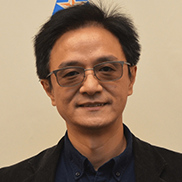Invited Speakers of MICAD 2025
(Alphabetize by Last Name)
Assoc. Prof. Mingchen Gao
University at Buffalo, SUNY, United States
Mingchen Gao is an Associate Professor in the Department of Computer Science and Engineering at the University at Buffalo, State University of New York. She received her Ph.D. in Computer Science from Rutgers University in 2014 and subsequently completed postdoctoral research at the NIH Clinical Center from 2014 to 2017. Dr. Gao’s research focuses on the intersection of machine learning and healthcare, with particular emphasis on medical imaging analysis. Her research has been published in leading journals and conferences, including IEEE PAMI, IEEE TMI, Medical Image Analysis (MedIA), ICML, ICLR, NeurIPS, CVPR, ICCV, ECCV, MICCAI, and IPMI. Dr. Gao is a recipient of the FIMH Best Paper Award (2011), the UB SEAS Early Career Researcher of the Year Award (2022), and the NSF CAREER Award (2023).
Speech Title: Label-Efficient Learning for Medical Image Analysis with Partially Labeled Data
Abstract: Deep learning has revolutionized medical image analysis, driving major advances in applications such as tumor and lesion detection and organ-at-risk delineation. Yet, behind every successful model lies a key bottleneck—obtaining large datasets with fully annotated masks. Creating these annotations is not only time-consuming and expensive but also demands substantial clinical expertise. In real-world settings, fully labeled data are often scarce, while partially labeled datasets are far more common. In this talk, I will explore how we can make the most of such partially labeled data through label-efficient learning. I will introduce several practical and effective methods that enable deep models to learn reliably under various partial labeling scenarios. Finally, I will discuss how these approaches can help build models across multi-site, large-scale medical datasets—paving the way toward more accessible and scalable AI solutions in healthcare.

Prof. Mingwu Jin
University of Texas at Arlington (UTA), United States
Director of Image Science and Computational Medical Physics (ISCOMP) lab
Dr. Mingwu Jin is a Professor in the Department of Physics and the director of Image Science and Computational Medical Physics (ISCOMP) lab at the University of Texas at Arlington (UTA). He received B.S. in Space Physics and M.E. in Electronics both from Peking University, Beijing, China, and Ph.D. in Electrical Engineering from Illinois Institute of Technology. One focus area of his research is to develop advanced algorithms, including deep learning methods, for medical imaging. He is a senior member of IEEE and the faculty advisor of a 2022-2023 Texas Advanced Computing Center (TACC) Frontera Computational Science Fellowship awardee. His research is well funded by NIH, DoD, and NASA.
Speech title: Generative models for denoising and super-resolution of low-dose X-ray computed tomography (CT)
Abstract: Generative adversarial (GAN) models are powerful to generate data that highly resemble the real data. Over years, we developed a series of GAN models to denoise and achieve super-resolution for low-dose X-ray CT: 1) A GAN model with a cycle consistency loss (CycleGAN) was proposed to translate low-dose CT images to regular dose CT images using unsupervised training, which pioneered the field; 2) A transformer was used in a GAN model for the super-resolution of low-dose CT; and 3) a RecycleGAN model was proposed to denoise multi-phase CT angiography image sequences. All these generative models substantially reduced the CT radiation dose while maintain the high image quality.

Prof. Jin Tae Kwak
Korea University, Korea
Principal Investigator
Quantitative Imaging & Informatics Laboratory
Jin Tae Kwak received his Ph.D. in Computer Science from University of Illinois at Urbana-Champaign, USA in 2012. He earned his Masters of Science degree in Electrical and Computer Engineering from Purdue University, USA in 2007 and his Bachelors of Engineering degree in Electrical Engineering from Korea University, Korea in 2005.
In 2012, He joined Center for Interventional Oncology, Clinical Center, National Institutes of Health, USA as a Research Fellow. He served as a tenure-track faculty member in the department of Computer Science and Engineering at Sejong University from March 2016 to August 2020. He joined School of Electrical Engineering at Korea University in September 2020.
His research interests include multimodal medical imaging, digital and computational pathology, computer-aided diagnosis, radiology-pathology correlation, data mining, artificial intelligence, machine learning, and deep learning.
Speech title: Computational pathology in the era of large-scale AI models
Abstract: Computational pathology is undergoing a profound transformation driven by advances in large-scale artificial intelligence (AI) models. The rapid adoption of digital workflows, combined with the growing availability of high-resolution whole slide images (WSIs), has enabled the development of AI systems capable of analyzing complex tissue patterns with unprecedented accuracy and scalability.
This talk will explore how recent advances in AI are being applied to computational pathology, with particular emphasis on the growing role of large language models (LLMs). These models, together with other deep learning techniques, are reshaping the field by enabling more sophisticated analysis, interpretation, and integration of multi-modal data into clinical workflow. The presentation will also highlight the broader opportunities that large-scale AI models offer in advancing and redefining the future of computational pathology.